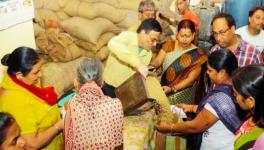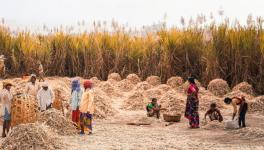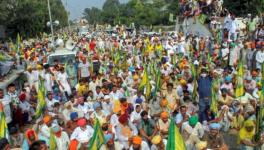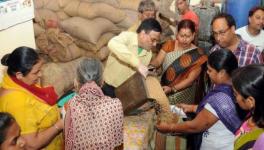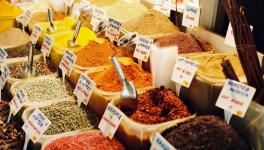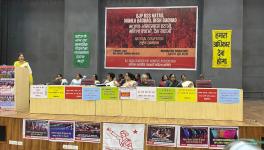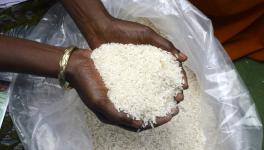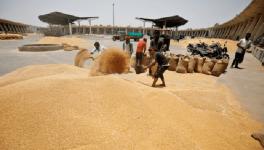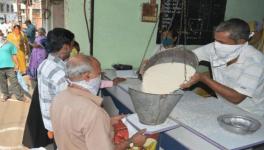Janta Parliament on Food and Nutrition Demands Universal Food Entitlements After Pandemic
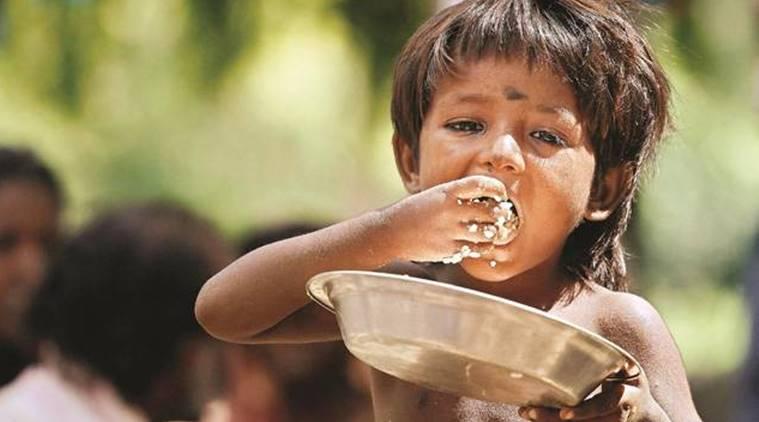
Representational image. Image Courtesy: The Indian Express
An online session on Food Security and Nutrition, organised by the Right to Food Campaign (RTFC), on August 17 has raised the demand for universal food entitlements after the COVID-19 pandemic. The session was organised as part of the Janta Parliament, held by civil society organisations and peoples’ movements in the absence of Parliament sessions which have remained suspended amid the pandemic.
The aim of the Janta Parliament, organised from August 16 to 21, is to discuss urgent pandemic related policy measures and a variety of social issues from health to civil liberties.
In a press statement released by the RTFC, it highlighted that in a country which has the world’s largest undernourished population, the pandemic induced lockdown has seriously threatened food security of the people. Over 40% Indians do not even have the National Food Security Act (NFSA 2013) ration cards, further endangering their food security. While the Parliament sessions have been stalled, several provisions of the law have been violated during the pandemic. School and anganwadi children across India have not been uniformly provided dry rations or cooked meals. Maternity entitlements for pregnant and lactating mothers have been virtually stalled during the lockdown.
In the three-hour long session presided over by Annie Raja of the National Federation of Indian Women, several eminent economists, veteran activists, academics, grassroots workers from across the country, discussed effect of the lockdown on food security. Referring to the government’s failure in the proper distribution of ration, social activist Harsh Mander said, “Ration
kagaz mein hai thali mein nahi (people’s rations are only on paper, not on their plates).”
Emphasising on the universalisation and inclusion of nutritious food items in the public distribution system (PDS), economist Jean Drèze said that, “Poor people do not have any say at all in these policies for the moment and that is why it is so important for the Parliament to start functioning, because it gives atleast a limited possibility of people to be heard if only through their representatives.”
Speaking in the segment on vulnerable communities and their food security during the pandemic, Rachana Mudraboyina said, “The transgender community do not have aadhar card or bank accounts and therefore no ration card or eligibility for any monetary benefits. All transpersons should get ration cards, right to buy property, assistance in opening bank accounts.”
The session has put forward seven resolutions which were almost unanimously voted in favour by the participants. These include:
● Universalisation of PDS with pulses and oil without mandatory Aadhaar or Ration cards
● Comprehensive Nutrition including Eggs and Fruits to all children under ICDS and MDM
● Unconditional and Universal Maternity Entitlements without any Restrictions
● Free Community Kitchens for Homeless and Migrants
● Community Kitchens and Relief in Flood and Cyclone Affected Areas
● Make provision of anganwadi and supplementary nutrition an essential service
● Ration card for all vulnerable populations including trans people
The complete statement is given below.
Janta Parliament Demand for Universal Food Entitlements after the Pandemic
India has the world’s largest undernourished population. Forty percent of Indians also do not
have a National Food Security Act (NFSA, 2013) ration cards. Other provisions of the law have
also been violated during the pandemic. School and anganwadi children across India have not
been uniformly provided dry rations or cooked meals. Maternity entitlements for pregnant and
lactating mothers have been virtually stalled during the lockdown.
World over, many countries have moved to virtual Parliament sessions to continue its functions
and keep a check on the executive. But in India, even controversial policy decisions by the
government have escaped any legislative scrutiny or representative accountability. Therefore,
several civil society organisation networks and peoples’ movements, have organised an online
Janta Parliament from 16th August to 21st August to discuss urgent COVID-19 pandemic related
policy measures. Overall the online programme over 6 days will cover 11 thematic sessions from
health to civil liberties. In this context, the special session on Food Security and Nutrition was
organised by the Right to Food Campaign on 17th August from 10 a.m. to 1 p.m.
For the entire 3 hours, Annie Raja of the NFIW was the Presiding Officer. The online session had
a series of speakers including economists, veteran activists, intellectuals, academics and
grassroot workers from Jammu to Telangana and Gujarat to Assam. Pre-recorded video
testimonies from villages across India on the situation of food insecurity were also shown with
the intent that Parliament too should hear people’s voices and issues.
The session began with Gangaram Paikra, the co-convenor of the Right to Food Campaign in his
opening remarks said, “people are going through situations of increased hunger and migration
due to unplanned lockdown. Ration has failed to reach to people in both rural and urban areas.
Anganwadi centers should be re-opened immediately, community kitchens should be set up and
nutritious food should be distributed.”
Social activist Harsh Mander poignantly remarked that in the midst of the pandemic, “ration
kagaz mein hai thali mein nahi” (people’s rations are only on paper, not on their plates.) He also
said that, “the present crisis is not because of Coronavirus but because of the decisions made by
the government in past and present”.
Fr Jothi from West Bengal reflected a national concern when he emphasised that by not
providing midday meals and integrated child development scheme (ICDS) nutrition to children
during the pandemic, the government “has stolen from the rightful share of” children’s and
mother’s rightful entitlements.
Rachana Mudraboyina, echoed the plight of all vulnerable communities during the pandemic
that, “The transgender community do not have aadhar card or bank accounts and therefore no
ration card or eligibility for any monetary benefits. All transpersons should get ration cards, right
to buy property, assistance in opening bank accounts”.
Economist Jean Drèze was emphatic that the solution for this malady included, “Universalisation
and inclusion of nutritious food items in the public distribution system (PDS).” He also
emphasised that “poor people do not have any say at all in these policies for the moment and
that is why it is so important for the Parliament to start functioning, because it gives atleast a
limited possibility of people to be heard if only through their representatives .”
Parliamentarian Amee Yagnik from the Indian National Congress who attended the session,
“The malnutrition in the country was already high and post lockdown children would be pushed
to further hunger and malnutrition.” She also reassured that she will definitely take these issues
and suggestions forward in Parliament as soon as it resumes and also request for a short
duration discussion on food security in light of the pandemic.
The framework on PDS and Nutrition was presented by Reetika Khera (IIT Delhi) and the
speakers included Rupesh (RTFC Bihar), Sunita (RTFC UP and Sahyog India), Upasana Behar
(MPLSSM and RTFC), Dheeraj (Bashin Nahin Ration Do Muhim, Jammu), Sharda Gopal (RTFC
Karnataka), Balram (RTFC Jharkhand), Mukta Shrivastav (Anna Adhikar Abhiyan, Maharashtra),
Biplab (BGVS), Amrita Johri (Anna Adhikar Abhiyan, Delhi).
The segment on vulnerable communities and their struggle for food security, included Sunil
Kumar Aledia (National Forum for Homeless Housing Rights) and Rachana Mudraboyina,(Transgender network) along with representatives of networks of differently-abled persons and
sex workers through pre-recorded videos.
The priority demands on Children’s and Maternity entitlements were put forth by Devika Singh
(Mobile Creches) and Dipa Sinha (Ambedkar University), and the speakers from across India
included Fr Jothi (RTFC West Bengal), Nesar Khan (RTFC Rajasthan), Sangeeta (RTFC
Chhattisgarh), Tarulatta (RTFC Gujarat), Chakradhar (RTFC AP), O.P Bhuraita (BGVS Himachal
Pradesh) and Bidyut Mohanty (RTFC Odisha).
There was more than 99 percent voting in favour of all the 7 resolutions which were voted on:
● Universalisation of PDS with pulses and oil without mandatory Aadhaar or Ration cards
● Comprehensive Nutrition including Eggs and Fruits to all children under ICDS and MDM
● Unconditional and Universal Maternity Entitlements without any Restrictions
● Free Community Kitchens for Homeless and Migrants
● Community Kitchens and Relief in Flood and Cyclone Affected Areas
● Make provision of anganwadi and supplementary nutrition an essential service
● Ration card for all vulnerable populations including trans people
Get the latest reports & analysis with people's perspective on Protests, movements & deep analytical videos, discussions of the current affairs in your Telegram app. Subscribe to NewsClick's Telegram channel & get Real-Time updates on stories, as they get published on our website.









